初中英语时态之一般将来时
英语时态之一般将来时(练习题及答案)

英语时态之一般将来时一、什么是时态时态就是表示一个动作发生的时间和所处的状态。
“时”就是这个动作发生的“时间”;“态”就是这个动作在某个时刻的“状态”。
二、时间的定义英语中把时间分为三类,即:过去现在将来三、状态的定义状态指的是在某个时刻这个动作所处于的状态。
动词共有四类状态,分别为:一般式、进行式、完成式和进行完成式。
1.一般式表示经常发生的动作,其动词形式为do例:I often get up at 7.我经常在七点钟起床。
2.进行式表示正在进行的动作,其动词形式为“be动词+ doing”例:She is singing a French song.她正在唱一首法语歌。
3.完成式表示对“之前发生动作”的一个总结,其动词形式为“have + done”例:They have found the missing child.他们找到那个失踪的孩子了。
4.完成进行式表示对“正在进行动作”的一个总结,其动词形式“have + been + doing”例:I have been reading books for two hours.我已经连续读书两个小时了。
四.一般将来时(will do):一般将来时表示某个将来的时间发生的动作或存在的状态。
1.在表示预测时,在一般将来时态中will和be going to的区别:(1).用be going to 特别指根据目前的明显迹象来推断某件事将要发生;而will则只是表明说话人认为或相信某件事将要发生。
(2).be going to 通常用来表示说话人预期所说的事件马上或在相当近的将来就要发生;而will 所表示的动作发生的时间可近可远。
2.在表示意愿时,在一般将来时态中will和be going to 的区别:(1)be going to 表示说话人对未来行动的计划或打算,通常是经过事先考虑并含有已经为这一行动做了某些准备的意思。
(2)will表示在说话的时刻立即做出决定将去做某事,事先并没有经过考虑,更没有为这一活动做出事先的准备。
英语时态一般将来时知识清单总结及用法

英语时态一般将来时知识清单总结及用法1、一般将来时的结构2、一般将来时的结构变化3、知识要点一般将来时的用法(1) 表示将来的动作或状态,常与tomorrow,this evening. next Monday (week,month,year,in ten minutes,someday,in 2018,in the future 等单词或短语连用。
如:They say that the weather will be good tomorrow. 据说明天是好天气。
I shall have supper soon. 我要吃晚饭了。
There will be a class meeting this afternoon. 今天下午开班会。
He will come to see you next Monday . 他下周一会来看你。
(2) 表示即将发生的或最近打算进行的事,常用“be going to+动词原形”。
如:How are you going to spend your holiday ? 你们打算怎样度假?(3) 表示按计划即将发生的动作,常用go,come,start,move,leave等动词的进行时态。
如:He is coming in a minute . 他很快就来。
(4) 表示按计划要发生的事或征求对方意见,或表示安排、命令、预定好要做的事情,常用“be to+动词原形”。
如:The concert is to take place on Friday evening . 音乐会要在下星期五举行。
(5)表示即将发生的动作,或者表示立刻要做的事情,近在眼前的将来,常用“be about to+动词原形”。
如:Hurry up! The train is about to leave . 快点!火车马上要开了○(6) 一般将来时中be going to结构与will的异同点:①be going to结构和will的相同点:都表示将来的动作或状态。
英语动词时态用法归纳:一般将来时

英语动词时态用法归纳:一般将来时一、一般将来时的构成一般将来时的由s hall / will+ 动词原形构成。
二、一般将来时的基本用法(1) 表示单纯的将要发生的动作或情况。
常与表示将来的时间状语连用。
如:Tomorrow will be Sunday. 明天是星期天。
They say that it will rain. 他们说要下雨。
I’ll be thirty-seven on my next birthday. 到下次生日,我就三十七岁了。
We won’t be free tonight. 今晚我们没空。
(2) 也可以表示临时决定要做的事。
如:—I thought I asked you to sweep the floor.—O h, I’m sorry. Mother, I will do it right now.—我原以为我让你扫地了。
—噢,对不起,妈妈,我就做。
—You have left the door open.—O h, so I have. I’ll go and lock it.—你忘了锁门。
—哦,是的。
我就去。
(3) 有时虽没有时间状语,但从意思上可以判断指将来的动作。
如:Who will take the chair? 谁当主席?You will pass the examination. 你会通过那个考试的。
The meeting won’t last long. 会开不了多久。
(4) 一般将来时有时还表示倾向和习惯性。
如:Oil will float on water. 油总浮在水面上。
Fish will die without water。
鱼离开水就会死掉。
The machine won't work because of a faulty connection. 机器电源线接错了,所以开不动。
三、表示将来时的几种方法(1) be going to+动词原形。
英语时态:一般将来时

英语时态:一般将来时一般将来时(simple future tense)表示将来某一时段的动作或状态,或将来某一段时间内经常的动作或状态。
一般将来时常常和表示将来的时间状语连用。
如:tomorrow, next week, in the future, in a year等。
Ⅰ. 句法结构【仅讨论陈述句和疑问句两种语式】:1.陈述句:A. 肯定形式:主语+be going to /will/shall +动词原形+其他B. 否定形式:主语+be not going to /will not/shall not+动词原形+其他注:a. 在直接在助动词后加not。
b. be going to结构中的be仅指am, is, are三个be动词。
c. will/shall+动原结构在谓语两态变化中无人称和数的变化。
d. 一般情况下,仅表示时态时,shall用于第一人称,will用于第二、三人称;表示说话人强烈意愿和语气时则用法相反。
2.疑问句:A. 一般疑问句:助动词提前即可①Be动词+主语+ going to +动词原形+其他②Will/Shall+主语+动词原形+其他B.特殊疑问句:特殊疑问词+一般疑问句(同上)3.被动语态:主语+ 助动词(结构) + be +动词过去分词【被动结构be done,时体现在助动词】➢两态变化例句参考下表(以will为例):Ⅰ. 主要用法及结构:1.【一般将来时表将来】一般将来时表示将要发生的动作或情况。
A.will/shall +动原I will(shall) arrive tomorrow.Will you be free tonight?B.be going to+动原a.表示计划、打算、准备做的事。
We are going to put up a building here.b.表示即将发生或肯定要发生的事。
I think it is going to snow.注:在一般将来时的句子中,有时有表示将来时间的状语,有时没有时间状语,这时要从意思上判断是否指未来的动作或情况。
【初中英语】初中英语语法大全之一般将来时

【初中英语】初中英语语法大全之一般将来时【—之一般将来时】一般将来时表示将来某一时刻的将要发生动作或状态,或将来某一段时间内经常的动作或状态。
下面就是老师为同学们带来的对一般将来时的详细讲解,供同学们学习的参考。
总结顾名思义,通常将来时则表示将来某一时刻的将要出现动作或状态,或将来某一段时间内经常的动作或状态。
常常和则表示将来的时间状语属格,例如:tomorrow(明天),nextweek(下周),fromnowon(从现在已经开始);inthefuture(将来)等。
一、基本结构及用法1、will/shall+动词原形这种方法一般单纯地表示将来某个时间将要发生的动作或存在的状态。
will用于各种人称will常简略为'll,并与主语连写在一起,如:i'll,he'll,;shall只用于第一人称,在肯定句或否定句中表示将要或不会发生的事情或动作,在疑问句中可以表示建议或征求对方意见。
变否定句在will/shall后加not,缩略形式为won't;变疑问句把will/shall提到主语前。
比如:iwill/shallgotovisithimnextweek.下周我将回去造访他。
whattimeshallwegotheretomorrow?明天我们几点去那儿?2、begoingto动词原形(否定句、疑问句的变化彰显在be动词上)1)表示计划、打算、准备做的事。
比如:wearegoingtoputupabuildinghere.我们急于在这里砌一座楼。
howareyougoingtospendyourholidays?假期你准备怎样过?2)则表示即将出现或确实必须出现的事。
例如:ithinkitisgoingtosnow.我看要下雪了。
3、用现在展开时则表示常见考法对于通常将来时的考查,多以单选、句型切换或词语运用的形式考查学生在具体内容语境中灵活运用时态的能力。
在考试中,可以使大家推论与否该用通常将来时,以及如何恰当采用。
初中英语时态总复习:一般将来时 专题辅导

初中英语时态总复习:一般将来时一、构成:1)肯定形式:S+助动词shall/will/be going to+动词原形+O.2)否定形式:S+助动词shall/will not/be not going to+动词原形+O.3)疑问形式:助动词Shall/Will +S.+动词原形+O./ Be + S. +going to+动原+O.二、用法:1) 表示将来发生的动作或存在的状态,其构成是will+动词原形,常与表示将来的时间状语连用,如tomorrow, next week, in a few days, next Sunday, in +一段时间,in 2012等。
如:They will leave for Shanghai next week.Will you be back in two days?2) 当主语是I或we时,疑问句中一般使用shall,表示征求对方意见。
如:Where shall we meet tomorrow?3)“be going to +动原”表示a.主观上计划、打算做某事,表示已决定的、很可能发生的事,b.或有某种迹象表明要发生的事。
如:What are you going to do next Sunday?Look at the clouds. There is going to be a storm.4)只用shall/will表示将来,而不用be going to结构。
a. 表示有礼貌地询问对方是否愿意或表示客气的邀请或命令时。
如:Will you please lend me your bike?b. 表示意愿We will help him if he asks us.c. 表示单纯的将来,与人的主观愿望和判断无关时。
如:The sun will rise at 6:30 tomorrow morning.5)“be about to+动词原形”和“be to+动词原形”结构表示即将发生的动作。
新版初中英语主要时态系列(二)---- 一般将来时与过去将来时精讲及练习(有答案)

最新版初中英语主要时态系列(二)------ 一般将来时与过去将来时精讲及练习(有答案)一、一般将来时的含义:一般将来时表示将来某个时间要发生的动作或状态,或将来经常发生的动作或状态。
二、一般将来时的基本结构1. will/shall+动词原形will 在陈述句中用于各种人称;shall用于第一人称,常被will 所代替。
否定式:will not=won't;shall not=shan't一般疑问式:will/shall+主语+动词原形+其他?特殊疑问式:特殊疑问词+一般疑问式?I will/shall do a better job next time. 下次我要做得好些。
Oil and water will not mix. 油和水没法混在一起。
—Will he help you with your English tonight? 今天晚上他会帮助你学习英语吗?—Yes, he will./No, he won't. 是的,他会。
/不,他不会。
—When will you arrive for America? 你什么时候去美国?—Tomorrow. 明天。
2. am/is/are going to +动词原形否定式:am/is/are not going to +动词原形一般疑问式:am/is/are +主语+ going to + 动词原形+其他?特殊疑问式:特殊疑问词+一般疑问式?He is going to spend his holidays in London. 他打算在伦敦度假。
Look at the dark clouds. There is going to be a storm. 看那乌云,快要下雨了。
Is he going to collect any data for us? 他会帮我们收集数据吗?What are you going to do tomorrow? 明天你打算作什么?三、一般将来时的用法will+动词原形与am/is/are going to +动词原形的用法虽然都表示将来发生动作或情况,一般情况下能互换。
完整)初中英语一般将来时
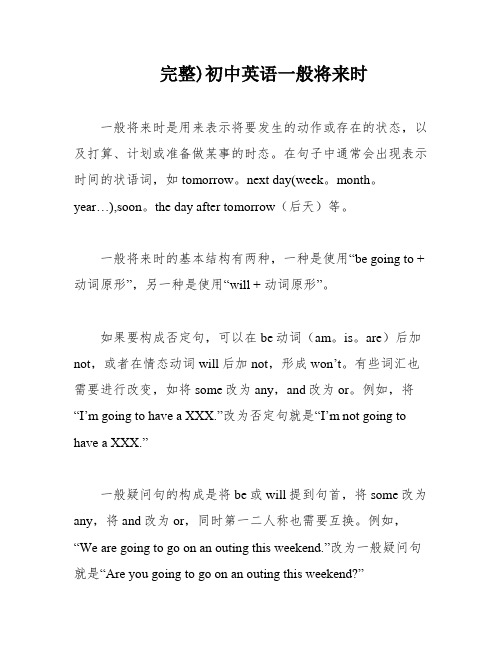
完整)初中英语一般将来时一般将来时是用来表示将要发生的动作或存在的状态,以及打算、计划或准备做某事的时态。
在句子中通常会出现表示时间的状语词,如tomorrow。
next day(week。
month。
year…),soon。
the day after tomorrow(后天)等。
一般将来时的基本结构有两种,一种是使用“be going to + 动词原形”,另一种是使用“will + 动词原形”。
如果要构成否定句,可以在be动词(am。
is。
are)后加not,或者在情态动词will后加not,形成won’t。
有些词汇也需要进行改变,如将some改为any,and改为or。
例如,将“I’m going to have a XXX.”改为否定句就是“I’m not going to have a XXX.”一般疑问句的构成是将be或will提到句首,将some改为any,将and改为or,同时第一二人称也需要互换。
例如,“We are going to go on an outing this weekend.”改为一般疑问句就是“Are you going to go on an outing this weekend?”对于划线部分的提问,一般将来时的对划线部分有三种情况。
第一种是问人,可以使用Who,例如“I’m going to New York soon.”改为问句就是“Who’s going to New York soon?”第二种是问干什么,可以使用What … do,例如“My father is going to watch a race with me this after noon.”改为问句就是“What is your father going to do with you this afternoon?”第三种是问什么时候,可以使用When,例如“She’s going to go to bed at nine.”改为问句就是“When is she going to bed?”同义句的构成是将be going to改为will,例如“I am going to go XXX.”可以改为“I will go XXX.”最基本的一般将来时结构是使用“will + 动词原形”,例如“XXX.”表示明天他们将要参观博物馆。
英语三大一般时态之三——将来时

一般将来时英语三大一般时态之三: 一般将来时一、构成一、构成等时间状语连用。
一般将来时表示将来发生的事。
常与tomorrow, next year等时间状语连用。
二、用法二、用法通常有以下七种方式表示将来,注意它们各自的区别。
1、由will 加动词原形构成,当主语是第一人称时,也可以用shall 加动词原形。
如:Telephone me this evening. I’ll be at home. 今晚给我打电话,我会在家。
今晚给我打电话,我会在家。
I’ll (shall/will) do a better job next time. 下次我要干得好些。
下次我要干得好些。
注意:注意:1)will还可用来表示同意或“不能”。
如:Come and see me tomorrow. Yes,I will. 明天来找我。
——好的。
好的。
不会晚的。
一Don’t be late. 一No,I won’t. 别来晚了。
——不会晚的。
The car won’t start. 车开不了啦。
车开不了啦。
Oil and water will not mix. 油和水没法混在一起。
油和水没法混在一起。
2)在“祈使句+and/or+陈述句”句型中,陈述句中只能用will或情态动词加动词原形。
如:Work hard, and you will pass the exam. 努力学习,你就会通过考试。
努力学习,你就会通过考试。
3)在条件句中表示将来不用will,而用一般现在时、be going to(打算) 或be to(为人所控制的动作) 等。
若你见到在条件句中用了will,那will 就是表示“愿意”的情态动词。
如:Let her do that if she will. 如果她愿意,就让她那样做。
如果她愿意,就让她那样做。
2、be going to 加动词原形,表示主语的意图或打算将来做的事。
如:加动词原形,表示主语的意图或打算将来做的事。
初中英语一般将来时态讲解
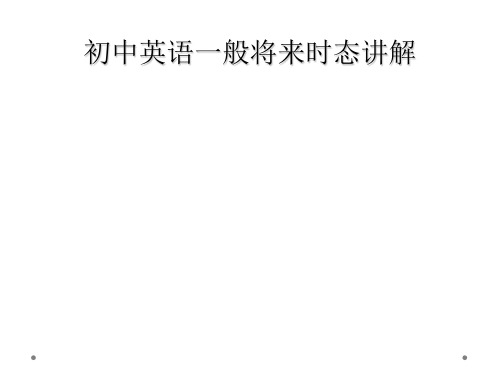
2、否定式
I shall not go to Europe next week. 下周我将不会去欧洲。 Lisa won’t be back in a few days. 丽莎几天后还不会回来。
3、一般疑问式
A: Will you go to Europe next week B: Yes, I will. B: No, I won’t. A: Will Lisa be back in a few days B: Yes, she will. B: No, she won’t.
不久后 before long a moment later
将来 in the future 明天早上 tomorrow morning
一小时后 one hour later in an hour
• be going to+动词原形
1、表示现在的意图,即打算在最近或 不久的将来做某事。
We are going to ask him. 我们打算问他。 What are you going to do tonight 你今晚打算做什么?
表示将要发生的动作或情况。如:
明天将会下雨。
It will rain tomorrow.
他将在下周一到达。
He will arrive next Monday.
我将永远不会忘记它。
I shall never forget it.
下次 next time 明天 tomorrow 明年 next year 今天下午 this afternoon 后天 the day after tomorrow
2、表示现在已有迹象表明即将 发生某事。
Look, it’s going to rain.
英语时态-一般将来时ppy
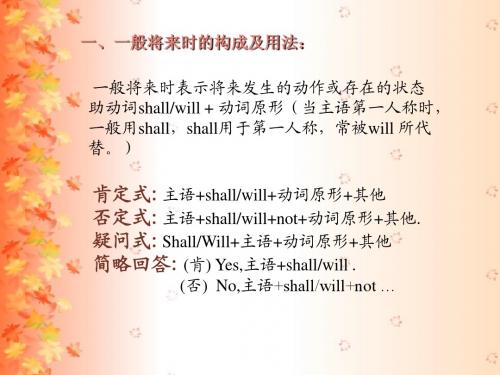
----I’m going to see a film.
You will be forty years old next year. Tomorrow will be Sunday again.
2. be going to+动词原形可表示事先计划的意图,而 will 则表示说话人当时决定的意图; We're going to drive you home after the meeting. Don't call a taxi. We'll drive you home. I feel ill now, and I'll go to see the doctor. I'm going to see the doctor this evening. He is studying hard and is going to try for the exams. 他 正努力学习,准备参加考试。(不能用will替换) —Can somebody help me? ——谁能帮我一下吗? —I will. ——我来。(不能用be going to替换)
The end
Thank you
(否) No,主语+shall/will+not …
肯定式: 主语+shall/will+动词原形+其他 否定式: 主语+shall/will+not+动词原形+其他.
谓语
主语
I, we He, She, You, They
助动词
Shall (will) not
动词原形
go (be)…. Wபைடு நூலகம்ll not
(二). be going to+动词原形 1. 表示说话人根据现在已有的迹象,判断将要或即将 发生某种情况。这类句子的主语可以是人,也可是物。 例如: There is going to be a football match in our school tomorrow afternoon. 明天下午我们学校将有一场足球赛。 (已有告示) 2. 表示主语现在的意图或现已作出的决定,即打算在最 近或将来进行某事。例如: He isn’t going to see his elder brother tomorrow. 他明天不 准备去看他哥哥。
初中英语时态知识点:一般将来时结构形式
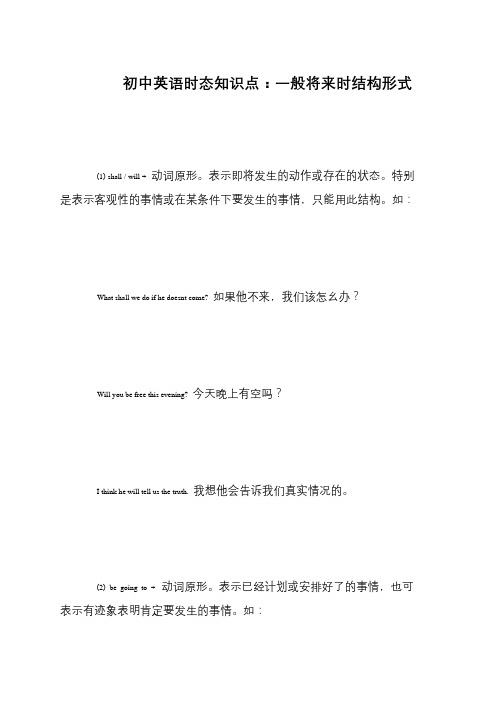
(1)shall/will+动词原形。表示即将发生的动作或存在的状态。特别
是表示客观性的事情或在某条件下要发生的事情,只能用此结构。如:
What shall we do if he doesnt come?如果他不来,我们该怎幺办?
Will you be free this evening?今天晚上有空吗?
如:
Who is to clean the classroom today?今天该谁打扫教室了?
When are you to return your library book?你什幺时候要还图书?
Thebridgeistobecompletedbytheendofthisyear.这渡桥该在今年年
了。
(5)be+现在分词。表示即将发生的动作或存在的状态。这个句型中
动词主要是瞬间动词:come,go,leave,arrive,begin,start,stop,close,open,die,
join, borrow, buy等。如:
Go ahead, and Im coming.走前面一点吧,我就来。
上开会讨论这件事情。
Lookattheblackcloudsoverthere.Ithinkitisgoingtorainsoon.看一
看那边的乌云,我想天要下雨了。
ThereisgoingtobeanEnglisheveningthisweek.本周要举行一个英语
晚会。
(3)beto+动词原形。表示一种常规性的活动或注定要做的事情。
The dog is dying.那条狗要死了。
Hurry up. The shop is closing.快点,商店就要关门了。
中考英语考点之一般将来时

中考英语考点之一般将来时命题趋势:动词的时态是中考出现频率较高的语法项目之一。
考题多以具体的语境为主,体现了对语法知识、语境理解、语言交际能力的综合考查。
中考考查重点:1. 了解并能运用常考的六种时态,尤其熟练运用一般现在时、一般过去时、进行时等高频时态;2. 正确辨析几种易混时态的区别。
一般将来时主要构成形式一般将来时表示将来某个时间要发生的动作,事情或存在的状态,也表示将来经常或反复发生的动作或事情。
1. will/shall+动词原形,shall用于第一人称,常被will 所代替。
will在陈述句中用于各人称,在征求意见时常用于第二人称,will not=won’t,shall not=shan’t。
Which paragraph shall I read first? 我先读哪一段呢?Will you be at home at seven this evening? 今晚七点回家好吗?2. be going to +不定式,表示将来。
a. 主语的意图,即将做某事。
What are you going to do tomorrow? 明天打算作什么呢?b. 计划、安排要发生的事。
The play is going to be produced next month。
这出戏下月开播。
c. 有迹象要发生的事。
Look at the dark clouds, there is going to be a storm. 看那乌云,暴风雨快来了。
3. be +不定式表将来,按计划或正式安排将发生的事。
We are to discuss the report next Saturday. 我们下星期六讨论这份报告。
4. be about to +不定式,意为"马上做某事"。
He is about to leave for Beijing. 他马上要去北京。
学&科网注意:be about to do不能与tomorrow, next week等表示明确将来时的时间状语连用。
初中英语六大时态归纳
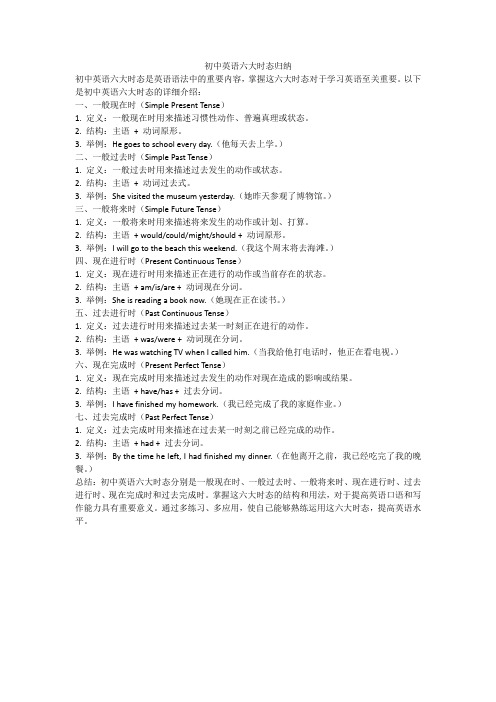
初中英语六大时态归纳初中英语六大时态是英语语法中的重要内容,掌握这六大时态对于学习英语至关重要。
以下是初中英语六大时态的详细介绍:一、一般现在时(Simple Present Tense)1. 定义:一般现在时用来描述习惯性动作、普遍真理或状态。
2. 结构:主语+ 动词原形。
3. 举例:He goes to school every day.(他每天去上学。
)二、一般过去时(Simple Past Tense)1. 定义:一般过去时用来描述过去发生的动作或状态。
2. 结构:主语+ 动词过去式。
3. 举例:She visited the museum yesterday.(她昨天参观了博物馆。
)三、一般将来时(Simple Future Tense)1. 定义:一般将来时用来描述将来发生的动作或计划、打算。
2. 结构:主语+ would/could/might/should + 动词原形。
3. 举例:I will go to the beach this weekend.(我这个周末将去海滩。
)四、现在进行时(Present Continuous Tense)1. 定义:现在进行时用来描述正在进行的动作或当前存在的状态。
2. 结构:主语+ am/is/are + 动词现在分词。
3. 举例:She is reading a book now.(她现在正在读书。
)五、过去进行时(Past Continuous Tense)1. 定义:过去进行时用来描述过去某一时刻正在进行的动作。
2. 结构:主语+ was/were + 动词现在分词。
3. 举例:He was watching TV when I called him.(当我给他打电话时,他正在看电视。
)六、现在完成时(Present Perfect Tense)1. 定义:现在完成时用来描述过去发生的动作对现在造成的影响或结果。
2. 结构:主语+ have/has + 过去分词。
初中英语时态知识点:一般将来时肯定形式
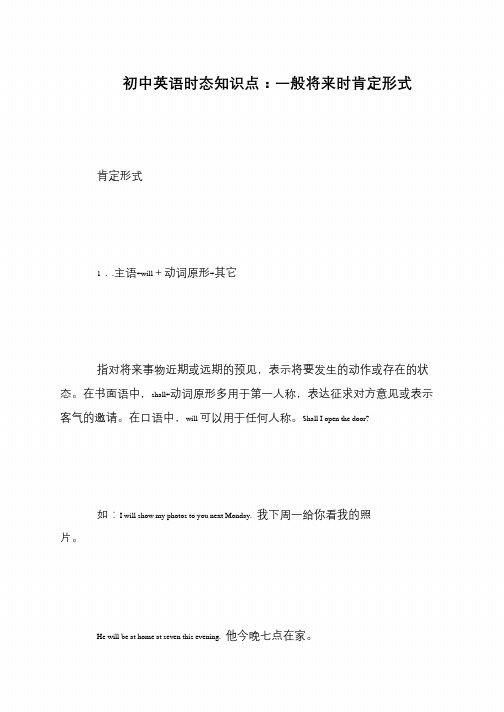
片。
He will be at home at seven this evening.他今晚七点在家。
They will come soon.他们很快就会回来。
Ill be 15 years old next year.
初中英语时态知识点:一般将来时肯定形式
肯定形式
1..主语+will+动词原形+其它
指对将来事物近期或远期的预见,表示将要发生的动作或存在的状
态。在书面语中,shall+动词原形多用于第一人称,表达征求对方意见或表示
客气的邀请。在口语中,will可以用于任何人称。Shall I open the door?
这个假期我打算去看望我的爷爷奶奶。
There is going to be a footballmatch this afternoon.
今天下午将有一场足球赛。
We are goinຫໍສະໝຸດ to have a meeting today.今天我们打算开会。
2.主语+be going to+动词原形+其它
结构用来表示按照主观意图打算或按计划,安排将要做的事,有打
算、就要的意思。也常用于表示从迹象上表明将要发生的事情,多指个人主
观臆断的推测。
如:Look at the clouds. Its going to rain.看这些云,要下雨了
I am going to visit my grandparents this holiday.
中考英语时态之一般将来时

A. receives B. received C. will receive
2. I__C___ a movie with you if I____free tomorrow. if当“如果”
A. see;am B. see;will be C.will see;am
讲,遵循
3. We__A__a party for Jenny. It's supposed to be a
Eg: I won't go abroad next month. ②be+not+going to+v.原
Eg: I am not going to have a party tomorrow.
一般疑问句:①will提前于句首; Eg: I will go abroad next month.--Will you
I'm coming. 3. 一般现在时表将来 1)严格按照原定计划、时刻表将要发生的事情 Eg: We have no classes tomorrow. 2)在时间状语或条件状语从句中,用一般现在时表将来(从句) Eg: I will call you as soon as I get home.
surprise.
根据语境可知将为她举办聚会
主将从现 原则
A. will have B. have C. had
ቤተ መጻሕፍቲ ባይዱ
其他表达法: 1.be going to+v.原表将来 Eg: I'm going to buy a car.(打算做)
It's going to rain soon. (根据迹象推断出来) 2.现在进行时表将来,常见词有go,come,leave,等 Eg: I'm leaving for Beijing.
- 1、下载文档前请自行甄别文档内容的完整性,平台不提供额外的编辑、内容补充、找答案等附加服务。
- 2、"仅部分预览"的文档,不可在线预览部分如存在完整性等问题,可反馈申请退款(可完整预览的文档不适用该条件!)。
- 3、如文档侵犯您的权益,请联系客服反馈,我们会尽快为您处理(人工客服工作时间:9:00-18:30)。
初中英语时态--- 一般现在时1.要在将来的某个时间内发生,是“纯粹的将来动作”。
eg I shall / will not be free tomorrow.2.表说话人的意图、打算或某种可能性eg Who is going to speak first?3.按计划要发生的动作或命令他人做某事eg The new bridge is to open to traffic in 3 days.、一般将来时结构常见结构1)shall / will + 动词原形这种表示方法是说,动作在现在或目前还未发生,要在将来的某个时间内发生;它没有主观性,是“纯粹的将来动作”。
will用于各种人称;shall只用于第一人称可表征求意见。
例如:I shall / will not be free tomorrow .我明天没空。
He will arrive here this evening .他今晚抵达这里。
2) be( am / is / are ) + going +不定式这种表示方法主要是说明A)“说话人的意图、打算”;B)“某种可能性”。
例如:A) He is going to spend his holidays in London . 他打算在伦敦度假。
Who is going to speak first? 谁先发言?B) It is going to rain soon .马上要下雨了。
Is he going to collect any data for us? 他会帮我们收集资料吗?If you go to New Zealand, you are going to like the place. 如果你去新西兰,你会喜欢上那个地方的。
3) be( am / is / are ) + 不定式表示方法描述两钟情况:按计划安排要发生的动作,这个动作发生的时间一般不会很远;要求或命令他人做某事。
例如:A) The new bridge is to open to traffic in three days. 新桥三天后通车。
The factory is to go into production before National Day. 这家工厂国庆节前投产。
B) You are not to bring any mobile communication means into the exam-room . 任何移动通讯工具都不得带入考场。
You are to stay home until your mother comes back. 你妈回来之前你不要出去。
4) 用一般现在时或现在进行时(限于某些动词)表示按计划安排要发生的事。
主要强调“按计划安排要发生的事”。
例如:Do you get off at the next stop? 你下一站下车吗?The plane takes off at 11:00 a.m. 那架飞机上午十一点起飞。
Mr. Reider is leaving for New York next week.里德先生下周动身去纽约。
一般将来时基本句型肯定句:I/We shall/will go. You/He/She/They Will go.否定句:I/We shall/will not go. You/He/She/They Will not go.疑问句:Shall I/we go? Will you/he/she/they go?简略回答:(肯)Yes,主语shall/will (否) No,主语shall/will not特殊疑问句:一般将来时的特殊疑问句是将疑问词放在句首,后接一般疑问句(就主语提问时,以疑问词who开头的疑问词除外)----- why will you be here on Sunday?-----I will have a meeting on Sunday(对特殊疑问句要进行具体回答)练习:一、单项选择( ) 1. There __________ a meeting tomorrow afternoon.A. will be going toB. will going to beC. is going to beD. will go to be( ) 2. Charlie ________ here next month.A. isn't workingB. doesn't workingC. isn't going to workingD. won't work( ) 3. He ________ very busy this week, he ________ free next week.A. will be; isB. is; isC. will be; will beD. is; will be( ) 4. There ________ a dolphin show in the zoo tomorrow evening.A. wasB. is going to haveC. will haveD. is going to be( ) 5. -_____ you ______ free tomorrow? - No. I _____ free the day after tomorrow.A. Are; going to; willB. Are; going to be; willC. Are; going to; will beD. Are; going to be; will be( ) 6. Mother ________ me a nice present on my next birthday.A. will givesB. will giveC. givesD. give( ) 7. - Shall I buy a cup of tea for you? -________. (不,不要。
)A. No, you won't.B. No, you aren't.C. No, please don't.D. No, please.( ) 8. - Where is the morning paper? - I ________ if for you at once.A. getB. am gettingC. to getD. will get( ) 9. ________ a concert next Saturday?A. There will beB. Will there beC. There can beD. There are( ) 10. If they come, we ________ a meeting.A. haveB. will haveC. hadD. would have( ) 11. He ________ her a beautiful hat on her next birthday.A. givesB. gaveC. will givingD. is going to giving( ) 12. He ________ to us as soon as he gets there.A. writesB. has writtenC. will writeD. wrote( ) 13. He ________ in three days.A. coming backB. came backC. will come backD. is going to coming back( ) 14. If it ________ tomorrow, we'll go roller-skating.A. isn't rainB. won't rainC. doesn't rainD. doesn't fine( ) 15. - Will his parents go to see the Terra Cotta Warriors tomorrow?- No, ________ (不去).A. they willn't.B. they won't.C. they aren't.D. they don't.( ) 16. Who ________ we ________ swimming with tomorrow afternoon?A. will; goB. do; goC. will; goingD. shall; go( ) 17. We ________ the work this way next time.A. doB. will doC. going to doD. will doing( ) 18. Tomorrow he ___ a kite in the open air first, and then ____ boating in the park.A. will fly; will goB. will fly; goesC. is going to fly; will goesD. flies; will go( ) 19. The day after tomorrow they ________ a volleyball match.A. will watchingB. watchesC. is watchingD. is going to watch( ) 20. There ________ a birthday party this Sunday.A. shall beB. will beC. shall going to beD. will going to be( ) 21. They ________ an English evening next Sunday.A. are havingB. are going to haveC. will havingD. is going to have( ) 22. ________ you ________ free next Sunday?A. Will; areB. Will; beC. Do; beD. Are; be( ) 23. He ________ there at ten tomorrow morning.A. willB. isC. will beD. be( ) 24. ________ your brother ________ a magazine from the library?A. Are; going to borrowB. Is; going to borrowC. Will; borrowsD. Are; going to borrows( ) 25. - Shall I come again tomorrow afternoon? -________ (好的).A. Yes, pleaseB. Yes, you will.C. No, please.D. No, you won't.( ) 26. It ________ the year of the horse next year.A. is going to beB. is going toC. will beD. will is( ) 27. ________ open the window?A. Will you pleaseB. Please will youC. You pleaseD. Do you( ) 28. - Let's go out to play football, shall we? - OK. I ________.A. will comingB. be going to comeC. comeD. am coming( ) 29. It ________ us a long time to learn English well.A. takesB. will takeC. spendsD. will spend( ) 30. The train ________ at 11.A. going to arriveB. will be arriveC. is going toD. is arriving二、用所给动词的一般将来时填空1. I ______(leave)in a minute. I ______(finish)all my work before I ______ (leave).2. -How long _____ you _____(study)in our country?-I _____(plan)to be here for about one more year.-I _____(hope)to visit the other parts of your country.-What ______ you ______(do)after you ______(leave)here?-I ______(return)home and ______(get)a job.3. I ______(be)tired. I ______(go)to bed early tonight.4. Mary's birthday is next Monday, her mother _____(give)her a present.5. It is very cold these days. It ______(snow)soon.6. -_____ you _____(be)here this Saturday?-No. I ______(visit)my teacher.7. -______ I ______(get)you a copy of today's newspaper?-Thank you.8. I am afraid there ______(be)a meeting this afternoon. I can't join you.9. Mike ______(believe, not)this until he ______(see)it with his own eyes.10. Most of us don't think their team ______(win).五、把下列各句译成英语1.我叔叔今晚要来。
